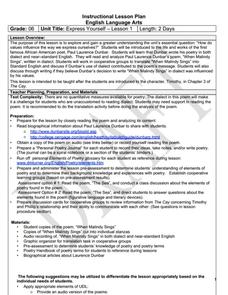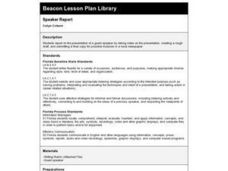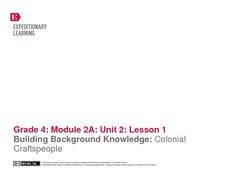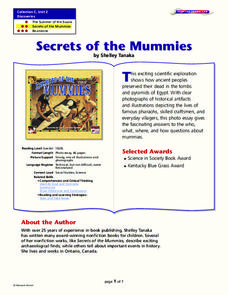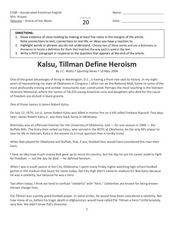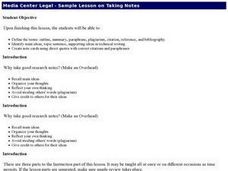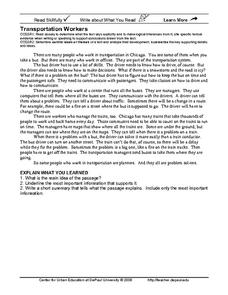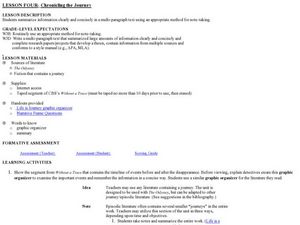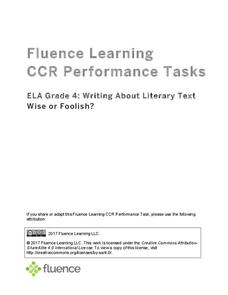Curated OER
The Long and Short of It: Summarizing Important Details
Students practice their summarizing skills while listening to a brief biography of Amelia Earhart. Students take notes while the teacher reads the article and write a paragraph that summarizes the important events from Amelia Earhart's...
Curated OER
6th Grade: Express Yourself, Lesson 1: Poem
While originally created to accompany The Cay, this poetry lesson could be used on it's own, especially if you are working on dialect. Class members conduct a close reading of "When Malindy Sings" by Paul Laurence Dunbar and listen to an...
Curated OER
Summarizing
Young scholars summarize articles, editorials, and news programs. In this writing skills lesson, students take notes on news stories about one issue from more than one source and then write summaries of the issue using rule-based summary...
Curated OER
Speaker Report
Fifth through eighth graders think of themselves as newspaper reporters as they listen to a presentation by a guest speaker. As reporters, they take notes during the presentation. Using these notes, they create a rough draft and then a...
K12 Reader
Summarize It!
A key reading comprehension skill is the ability to summarize. Here's a activity that not only explains how to summarize, but also explains why summarizing is important.
EngageNY
Mid-Unit 3 Assessment, Part II: Organizing Notes for a Public Speech
It's all a matter of opinion! Pupils take Part II of the mid-unit assessment, in which they continue organizing their notes in preparation for writing an opinion speech. Using the resource, they add reasons, evidence, and a concluding...
EngageNY
Building Background Knowledge: Colonial Craftspeople
In the first lesson plan of this unit on colonial trade, fourth graders gain background knowledge of different jobs performed by early colonists. The class begins with a slide show presentation that includes a variety of great...
Curated OER
Secrets of the Mummies
How did the ancient people of Egypt preserve their dead so well that their bodies are still recognizable today? Learn the painstakingly complex process they used for preservation. Young scholars read and summarize a narrative detailing...
Curated OER
Short and Sweet Science
Readers learn how to summarize scientific text and evaluate the advantages, disadvantages, and challenges in writing summaries. They select science-related articles you've pulled and collected from the New York Times and, with a partner,...
EngageNY
Close Reading and Summarizing: The Epilogue of Pygmalion
Moving from what to why. After completing questions over the epilogue of Pygmalion, scholars take a close look at their Eliza Character Trackers and complete part II. They have collected a lot of details about Eliza's character and now...
Curated OER
Kalsu, Tillman Define Heroism
In this article analysis worksheet, students read an article titled "Kalsu, Tillman Define Heroism," take notes on the article, define 2 words from the article, and write summaries of the article.
Curated OER
Writing a Summary
Skim, reread, and then take notes. The step-by-step procedure outlined in this resource can be used to help pupils write a summary of a reading passage. Using their notes, class members then draft a summary focusing on the main idea and...
Curated OER
Revive Reviews With Student-Created Study Guides
Students work cooperatively in small groups to practice note-taking and outlining skills which are applied as student create unit Study Guides for their classmates. They demonstrate critical thinking skills as they decide the most...
Read Write Think
Book Report Alternative: Rewind the Plot!
Have you ever looked for a new way to teach an old concept? Scholars thinking about the rising action of a story in a whole new perspective. However, Book Report Alternative: Rewind the Plot! challenges readers and allows for much...
Curated OER
Sample Lesson on Taking Notes
Have your middle schoolers define the terms outline, summary, paraphrase, plagiarism, citation, reference, and bibliography. They identify the main ideas, topic sentence, supporting ideas in technical writing and create note cards using...
Polk Bros Foundation
Science Learning Summary Guide
Apply reading standards to your science curriculum by asking pupils to complete this guide. Individuals note down important vocabulary as well as two ideas they learned and two supporting facts for each idea. They then take this...
Curated OER
Science NetLinks: Adolescent Sleep
Wake up, sleepy head! High schoolers craft a creative presentation that represents how they feel when they wake up on a school morning. After the presentations, a reading of Academic Sleep Times and Academic Performance launches a...
Curated OER
In-Text Citation
Wow! Here's a comprehensive look at the world of plagiarism. Types of plagiarism are defined, examples are shown, and in-text examples are highlighted. Being 75 slides long, this presentation is slightly overwhelming. Consider dividing...
EngageNY
Conducting Research: Asking and Answering our Questions about Rainforest Arthropods
Let's ask an expert. Scholars divide into groups to research and become experts on either ants or butterflies. Learners use task cards and text on their topic to complete a note catcher. At the end, they share their information with a...
Curated OER
Transportation Workers
Summarizing a text means being able to identify supporting details. Your class can learn about transportation workers in Chicago as they read a one-page informational passage. When they are finished reading they'll explain what they've...
Curated OER
Chronicling the Journey
Students chart the order of events in literature. In this literature lesson, students read The Odyssey and summarize the epic journey in their own words. Students then write about journeys they have taken in their own lives.
Curated OER
Putting it all Together
Students take notes and summarize information. In this communication lesson, students summarize information by taking notes using the various methods that their instructor presents to them.
Friends of Fort McHenry
Citizens For and Against the War of 1812
Use this exceptional resource to examine the discourse and debate that occurred at the start of the War of 1812 with your class. Learners will first consider their own position on the war in a silent journal writing activity. Then after...
Fluence Learning
Writing About Literary Text: Wise or Foolish?
A three-part assessment promotes reading comprehension skills. Class members read literary texts and take notes to discuss their findings, answer comprehension questions, write summaries, and complete charts.



